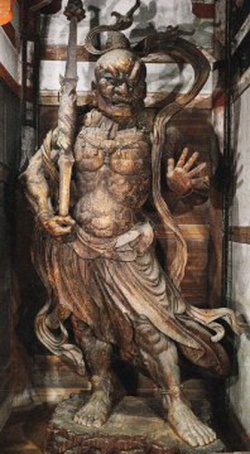Difference between revisions of "Eight difficulties"
(Created page with "thumb|250px| <poem> '''eight difficulties''' (八難). One has either no opportunity or no motivation to see a Buddha or hear His Dharma, while in any of t...") |
|||
| (2 intermediate revisions by one other user not shown) | |||
| Line 1: | Line 1: | ||
[[File:Unkei.jpg|thumb|250px|]] | [[File:Unkei.jpg|thumb|250px|]] | ||
<poem> | <poem> | ||
| − | + | [[eight difficulties]] ([[八難]]). One has either no opportunity or no [[motivation]] to see a [[Buddha]] or hear His [[Dharma]], while in any of the eight difficulties: | |
(1) as a hell-dweller; | (1) as a hell-dweller; | ||
| − | (2) as a hungry ghost; | + | (2) as a [[hungry ghost]]; |
| − | (3) as an animal; | + | (3) as an [[animal]]; |
| − | (4) as an inhabitant of Uttarakuru, the northern continent, where life is too pleasant; | + | (4) as an inhabitant of [[Uttarakuru]], the northern continent, where [[life]] is too [[pleasant]]; |
| − | (5) in deep meditation in a formless heaven; | + | (5) in deep [[meditation]] in a [[formless]] [[heaven]]; |
| − | (6) being blind, deaf, or mute; | + | (6) being blind, [[deaf]], or mute; |
| − | (7) as a worldly eloquent intellectual; | + | (7) as a [[worldly]] eloquent [[intellectual]]; |
| − | (8) in the period between the presence of one Buddha and the next. | + | (8) in the period between the presence of one [[Buddha]] and the next. |
| + | |||
| + | [[eight difficulties]] | ||
| + | [[八難]]・[[八難処]] ( Jpn [[hachi-nan]] or [[hachi-nansho]] ) | ||
| + | |||
| + | Eight places, states, or circumstances wherein one is unable to see a [[Buddha]] or to listen to his [[teaching]]. | ||
| + | |||
| + | They are: | ||
| + | (1) [[hell]]; | ||
| + | (2) the [[realm]] of [[hungry spirits]]; | ||
| + | (3) the [[realm of animals]]; | ||
| + | (4) the [[heaven]] of long [[life]] (any of the [[eighteen heavens]] in the [[world of form]] or the four [[heavens]] in the [[world of formlessness]] where [[beings]] live long; or, by another account, the [[Heaven of No Thought]] in the fourth [[meditation heaven]] in the [[world of form]]); | ||
| + | (5) [[Uttarakuru]], the continent [[north]] of [[Mount Sumeru]] where [[pleasures]] dominate; | ||
| + | (6) obstructions of the [[sense organs]], such as {{Wiki|blindness}}; | ||
| + | (7) [[attachment]] to and [[satisfaction]] with {{Wiki|secular}} [[knowledge]]; and | ||
| + | (8) the period before a [[Buddha's]] [[birth]] or after his [[death]]. | ||
| + | |||
</poem> | </poem> | ||
{{R}} | {{R}} | ||
[http://www.sutrasmantras.info/glossary.html#faculty www.sutrasmantras.info] | [http://www.sutrasmantras.info/glossary.html#faculty www.sutrasmantras.info] | ||
| − | [[Category:Buddhist Terms]] | + | [[Category:Buddhist Terms]]{{BuddhismbyNumber}} |
Latest revision as of 10:36, 22 April 2014
eight difficulties (八難). One has either no opportunity or no motivation to see a Buddha or hear His Dharma, while in any of the eight difficulties:
(1) as a hell-dweller;
(2) as a hungry ghost;
(3) as an animal;
(4) as an inhabitant of Uttarakuru, the northern continent, where life is too pleasant;
(5) in deep meditation in a formless heaven;
(6) being blind, deaf, or mute;
(7) as a worldly eloquent intellectual;
(8) in the period between the presence of one Buddha and the next.
eight difficulties
八難・八難処 ( Jpn hachi-nan or hachi-nansho )
Eight places, states, or circumstances wherein one is unable to see a Buddha or to listen to his teaching.
They are:
(1) hell;
(2) the realm of hungry spirits;
(3) the realm of animals;
(4) the heaven of long life (any of the eighteen heavens in the world of form or the four heavens in the world of formlessness where beings live long; or, by another account, the Heaven of No Thought in the fourth meditation heaven in the world of form);
(5) Uttarakuru, the continent north of Mount Sumeru where pleasures dominate;
(6) obstructions of the sense organs, such as blindness;
(7) attachment to and satisfaction with secular knowledge; and
(8) the period before a Buddha's birth or after his death.
